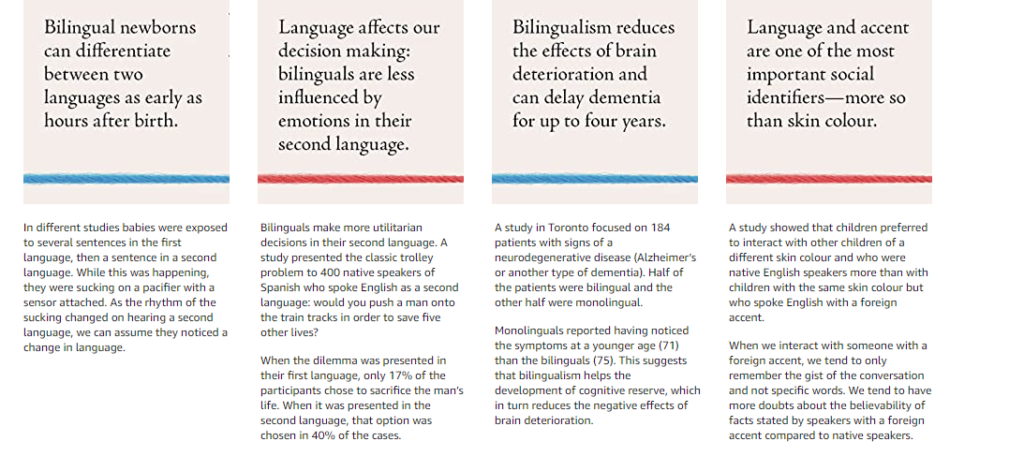Our team is surrounded by talented bilingual linguists, therefore we thought it made sense to dedicate some space to bilingualism. The world also counts many influential people who use their bilingual abilities to further their career success, from Mark Zuckerberg to Shakira to Madeleine Albright (according to www.babble.com*). There are many benefits to learning a second language for many different areas of life or career paths, and it is worth the effort required.
As any journey bilingualism can have different beginnings, therefore we would like to point out that there are different types of bilinguals depending how and when they acquired their second language.
There are THREE general types of bilingualism:
- Compound bilingual: develop two language systems simultaneously with a single context.
- Coordinate bilingual: learn two languages in distinctively separate contexts.
- Sub-coordinate bilingual: learn the secondary language by filtering through the mother tongue
To a native speaker, a compound bilingual and sub-coordinate might sound different as the compound might sound “native” whilst the sub-coordinate speaker might still retain his/her first language accent.
In his book “The Bilingual Brain: And What It Tells Us about the Science of Language”, Albert Costa analyses bilingualism from its onset to its effects on people affected by dementia. As a linguist but also a parent of a bilingual child (or wannabe one), I have always been fascinated by the science behind languages. From “the one person, one language” person approach to watching tv, there are plenty of strategies to implement the use of the “non-community” language although in our education system, second languages are often not considered “skills”.
Learning a (second) language from birth is undoubtedly one of the biggest advantage we can give you to our children. Recent studies (and my own experience) that bilingualism does not cause any language delays.

Earlier, I have used the term community language instead of “mother tongue”. In my own experience, in our global society, kids often tend to speak in the community language more than in the parent’s language, once they start formal education therefore a child raised bilingual might have stronger grammatical and writing skills in the community language and have only a “spoken” knowledge of the actual “mother tongue” if no formal education occurred.
When exploring language learning, Costa emphasises the important of interaction “Social communicative interaction is fundamental to the learning of a foreign language and the mere exposure does not seem to lead to such learning.“. If you have learnt a second language later in life only from books, you will probably have experienced a state of shock when visiting the country and been barely able to understand the language.
Studies proved that children preferred to interact with other children of a different skin colour as long as they were native speakers of English; more so than with the children who spoke English with a foreign accent. Language and in this case accent is indeed a social identifier (and not only in children).
The book has been very stimulating and good food for thought. Are you a bilingual or trilingual translator and want to share your story with us?
Drop us a message and you can feature in our blog!